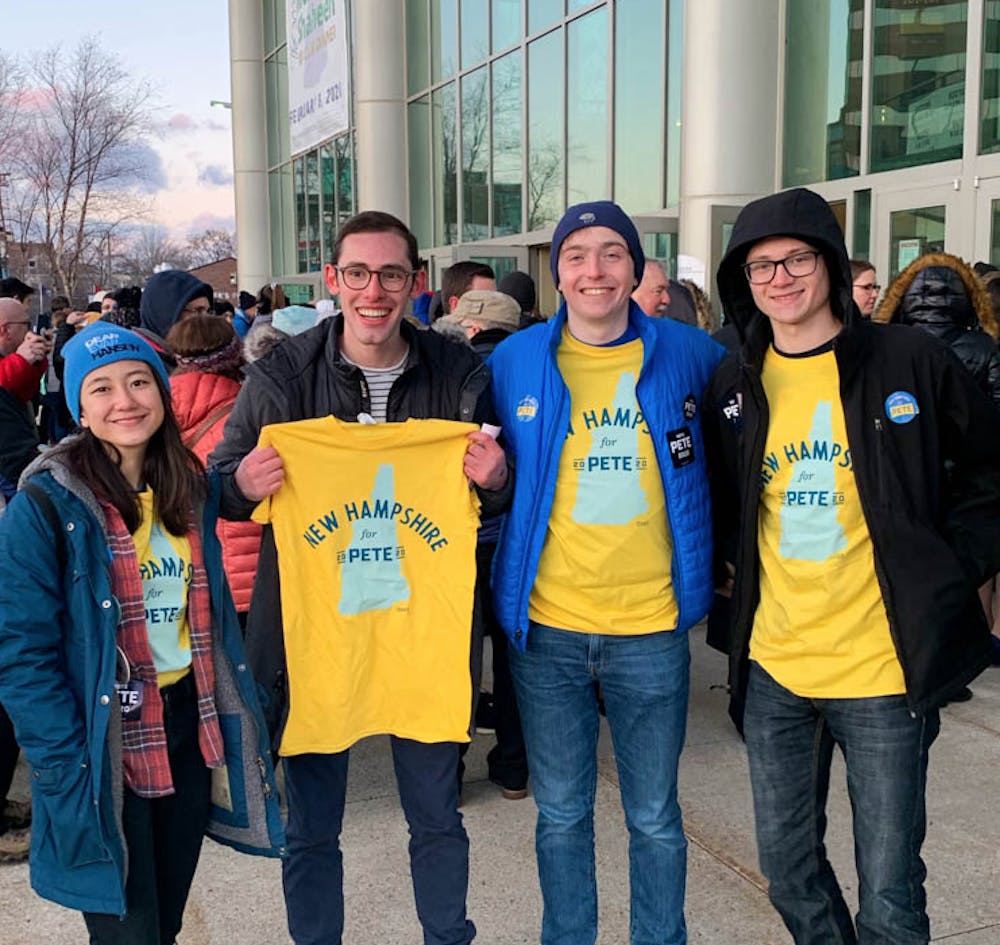When Alison Swinth ’22 knocked on the front door of a modest home in the outskirts of Epping, New Hampshire, she was greeted by a man wearing nothing but a towel.
“No, sorry, I’m a Trump supporter,” he said after glancing at her pamphlets. “And I’m about to have a shower.” Swinth, a member of Brown Students for Warren, wished him a good afternoon and shut the door.
Swinth was one of dozens of University students who left Providence for the rural roads and subzero temperatures of New Hampshire last weekend to canvass for the state’s Tuesday primary. Going door to door, they asked strangers if they could be counted on to support their particular candidates in one of the first tests of the Democratic nomination process. When the canvassers left and the votes were tallied Tuesday night, Sen. Bernie Sanders (I-VT) was declared the New Hampshire primary winner. By press time, former Mayor of South Bend, Indiana, Pete Buttigieg and Sen. Amy Klobuchar (D-MN) had respectively come in second and third in the primary.
The primary was a big moment for student organizers. In recent months, students have canvassed in the Sharpe Refectory, hosted debate watch parties and tabled on the Main Green to garner support for their choice candidates. With all eyes on New Hampshire, members of Brown Students for Bernie, Brown Students for Warren and Bruno for Pete left Rhode Island to take their messages of support to the Granite State.
“I left feeling like there are few better ways to participate in democracy than going up and talking to someone on their front porch or through a half-cracked screen door about the problems that our country is facing,” Nathaniel Pettit ’20, a coordinator for Brown Students for Warren, told The Herald.
Armed with clipboards and colorful pins, dozens of Providence-based supporters of Sanders gathered at Providence Station early Saturday morning to board a bus headed to Manchester, NH. Among them was Jack Doughty ’22, a member of Brown Students for Bernie, determined to do his part to boost voter turnout.
Though an experienced organizer in Rhode Island, Saturday was Doughty’s first time canvassing in New Hampshire. Ten hours and some 80 doors later, Doughty headed back to College Hill feeling as dedicated to the Sanders campaign as ever. “It was an incredible experience,” he said. “It solidified my commitment to doing everything I can.”
The canvassing experience also gave students the opportunity to understand voter support outside the college campus environment.
“I came back yesterday definitely understanding more the true working class support that Bernie has, ” he said, and the “motivations for supporting his policies and what brought (Sanders’ supporters) to want these kind of things out of a government.”
Conversations with people who had never voted before but were planning to turn out to the polls to cast their ballot for Sanders were particularly inspiring, he added.
Rhode Island for Bernie had also sent full buses of volunteers to New Hampshire’s streets on Sunday and Tuesday, said Doughty.
Manchester also hosted a handful of University students campaigning for Buttigieg.
Despite leaving campus at 7:30 a.m. and returning home after midnight, Joshua Neronha ’22, a Bruno for Pete member, insisted that the day had been more energizing than exhausting.
“Living in a state like Rhode Island where the primary is so late,” Neronha said that the opportunity to see “such intensity and enthusiasm” firsthand on the ground in New Hampshire was thrilling.
“Talking to voters about their concerns, hearing what they found valuable in a candidate,” was a meaningful experience, regardless of who the voter supported.
For Neronha, the highlight of the day came with the second-to-last door knock. Noticing no car parked in the driveway, he was about to assume no one was home but decided to double-check — just in case. After a sturdy knock, a 97-year-old woman cracked open the front door.
“She really liked Pete and was really supportive of him and excited about what he could bring to our country,” Neronha said.
But Neronha soon learned that she had no way of getting to the polls. The canvassers were able to connect her with campaign staff in the area who agreed to drive her to the poll location Tuesday.
“It was a really special moment for me because I think that, so often, we leave people out of the electoral process,” Neronha said. “There is so much attention (on) polls that it is easy to forget that elections are about people.”





